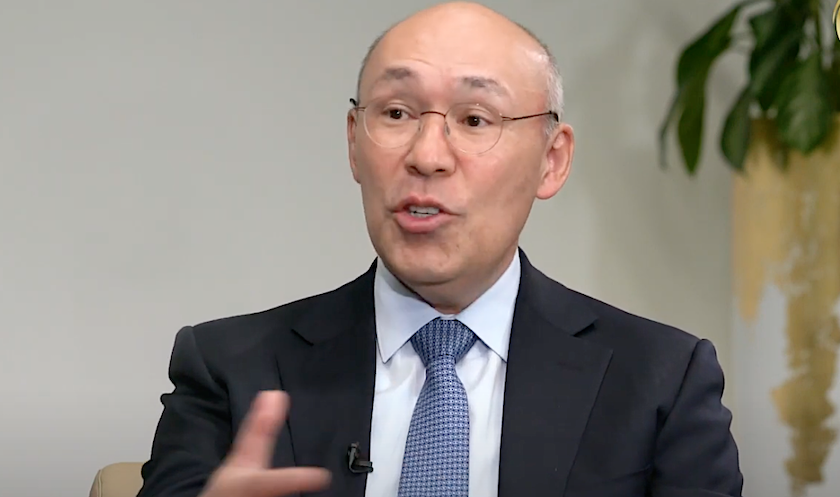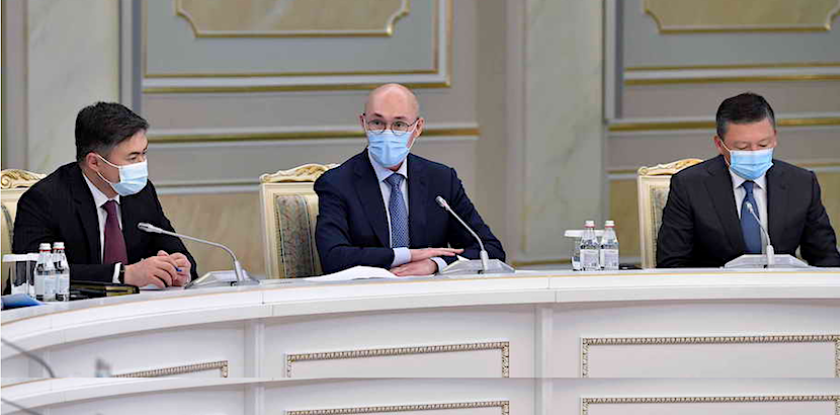Kayrat Kelimbetov’s return to the political front-stage was one of last year’s super-ordinary events in Kazakhstan. Moreover, we have observed his transformation from a manager who successfully fails at all of his undertakings into a leader paving his county’s way towards a better future. There is no other way to describe his appointment as the Chairman of the Agency for Strategic Planning and Reforms.
Keminbetov is one of the ambiguous if not to say scandalous figures in the existing power structure.
For instance, his biography presented in broad brush strokes on the official Agency for Strategic Planning and Reforms (ASPAR) website says nothing about the fact that he, together with Mukhtar Ablyazov and Galymzhan Zhakiyanov, was one of the co-founders of the Democratic Choice of Kazakhstan (DCK) civic movement. Later, however, he and some other people who then founded the Ak Zhol Democratic Party of Kazakhstan had left the movement. When Kelimbetov realised that he had made a political error, he prostrated himself before Nursultan Nazarbayev and was forgiven. Afterwards, had obtained numerous governmental posts and left them under unfortunate circumstances.
Judging by the fact that the information about his involvement in the DCK is also absent from the other versions of Kayrat Kelimbetov’s biography, for instance, the one published on popular website zakon.kz, he has taken special pains to have this mistake disappeared. Therefore, to those who wish to examine the life of Akorda’s new “steersman”, we recommend using at least several sources including Wikipedia.
The mere fact that President Kossym-Jomart Tokayev has appointed Kayrat Kelimbetov the Chairman of the ASPAR and that Nursultan Nazarbayev has approved the appointment shows that the political ostracism experienced by Kelimbetov after the national currency devaluation has ended.
At the same time, the fact that it was Kayrat Kelimbetov who was in charge of the National Bank at the time when, due to political reasons, Akorda had been trying to preserve the tenge exchange rate and spent a gigantic sum of foreign currency including the resources of the regulator and the National Fund cannot be ignored.
Moreover, this fact (as several others) makes one seriously doubt not only and not so much the ASPAR Chairman’s professional skills as a macroeconomist and top-executive as his political bravery to tell the truth to the authorities and to defend his principles.
We fully allow for the possibility that the Elbasy has not forgotten his strong feelings about the useless spending of foreign currency at the time they wanted to preserve the tenge exchange rate (see here). At the same time, he has forgiven Kelimbetov and let his successor appoint him as a high-rank state official only because there have been no other candidates aspiring to take on such a complex (in our opinion, irresolvable) task as the cardinal reformation of the national economy and the pushing it up to the level of the developed countries without a drastic change of the political system.
In view of this, we are curious to know if the ASPAR Chairman understands it himself?
Most likely, he does since he is definitely not a stupid man. It’s just that he lets himself be governed by the principle of Hodja Nasreddin who took a large amount of gold coins and, in exchange, promised to teach theology to a donkey.

To confirm this, let is recall Kelimbetov’s interview to Kazakhstan’s main official newspaper “Kazakhstanskaya Pravda”. On February 2, 2021, it published a material exuberantly titled “Kayrat Kelimbetov: The Centrality of the Individual is the Reforms’ Fundamental Value”.
Let us quote some of Kelimbetov’s statements. As you will see, these statements are flattering for Akorda and lamentable for most of the Kazakh citizens.
“Our country’s authorities’ response to the coronavirus challenge and the related crises have been highly esteemed by foreign experts. For instance, our Russian colleagues have repeatedly praised the idea of using the National Fund to support the citizens left without a source of income and also small and medium-size businesses. The system created by the Elbasy has demonstrated its general stability and self-sustainability. Not only has it been able to cope with the problems, it also has gained its own combat experience.
But now the task at hand is to quickly return to the main trajectory of the country’s development until 2050 outlined by the First President.
– So, reexamining the strategic goals is not one of the ASPAR’s objectives?
– There is no need for that. Kazakhstan’s long-term strategy outlined by the Elbasy must not be re-examined. The Kazakhstan-2050 Strategy, even ten years after its publication, has not lost its topicality and continues to be a wonderful tool for the long-term planning. On one hand, it forms the general objectives for the state agencies, on the other – paints a clear picture of the future for the citizens.
As for ‘The Five Institutional Reforms’ and the ‘100 Steps’ national plan, they specify how the objectives are to be attained, set clear tasks.
In 2015, a number of international experts said that, if even 50 out of the 100 parts of the national plan were accomplished, Kazakhstan would develop into a cardinally different state.
For me personally, it is a great honour to be involved into the implementation of the national plan. From 2015 until 2020, as the Astana International Financial Centre’s Governor, I had been working on implementing four out of the 100 steps related to founding of the agency. Starting from 2020, as the Chairman of the ASPAR, I have been helping to implement other steps of the plan”.
Based on these statements, we can draw the following conclusion: there is no reason to worry about the prospects of Kelimbetov’s career as a courtier and a flatterer; at the same time, the Kazakh citizens shouldn’t waste their time hoping for actual reforms that can improve the quality of life.





